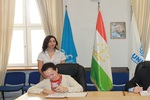Home > News of the Region > News
News

UNHCR conducts a press conference aimed at raising awareness about statelessnessOn September 5, 2011 - UNHCR Kazakhstan conducted a press conference devoted to the 50th anniversary of the 1961 Convention on the Reduction of Statelessness. This conference is part of the worldwide UNHCR campaign to combat statelessness. The event drew wide attention of the media representatives. More than 20 mass media representatives attended the press conference; among them were international and local news agencies, TV channels and others. UNHCR emphasized on the importance of combating and preventing statelessness the problems the stateless people face in real life. Mr. Saber Azam, UNHCR Regional Representative/Regional Coordinator for Central Asia invited all governments in Central Asia to take advantage of the 50th anniversary and make concrete pledges during the Ministerial Conference in December 2011 in Geneva. He also offered UNHCR's full support to States who were willing to make a difference. "The issue of statelessness is a painful challenge for States but especially for the stateless people themselves. They are deprived from the basic right of having a defined and recognized nationality. They do not have access to education, health care, job market and ability to travel. Children of stateless people can not attend school or benefit from proper juvenile care. On the territory of the former USSR, they are usually holders of old Soviet passports, who did not claim their nationality for various reasons after the collapse of the Soviet Union. The first step to reduce the number of stateless people is registration of undocumented persons in a country. In this regards I would like to stress that the recently conducted registration in Turkmenistan is an excellent example to follow as it will allow, among other very positive results, several thousand of stateless people to obtain citizenship" - underlined Mr. Saber Azam. UNHCR estimates that there are up to 12 million stateless people in the world, but defining exact number is hugely problematic. Inconsistent reporting combined with different definitions of statelessness means the true scale of the problem remains elusive. To overcome this UNHCR is raising awareness about the international legal definition while improving its own methods for gathering data on stateless populations. So far, 38 countries have acceded and ratified the 1961 Convention. UNHCR is, therefore, calling on the remaining states to do the same and take concrete measures to effectively reduce and prevent statelessness.
09.09.2011 |

Refugee athletes compete for first time at Asian Games
25.09.2017

Refugee athletes prepare to compete at Asian Games in Turkmenistan, as Opening Ceremony takes place
18.09.2017

UNHCR supports the right of refugees to education
07.09.2017

Sowing Seeds of Hope
24.07.2017

UNHCR and Sheraton Setting Up Innovative Partnership
04.07.2017

The World Refugee Day 2017 in Almaty
29.06.2017

Reaching Out to Youth
16.06.2017

UNHCR at EXPO-2017 Astana
14.06.2017

Roundtable on Birth Registration
12.06.2017

JOINT COMMUNIQUE BETWEEN UNHCR AND UNICEF
02.06.2017

